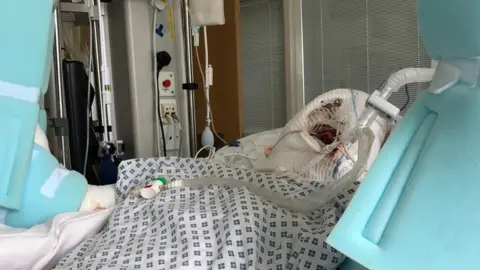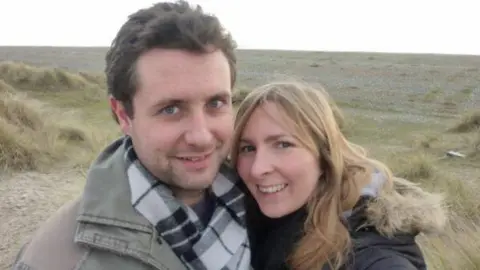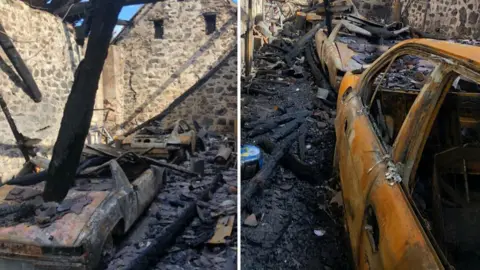Ambulance delay burns victim Chris Williams-Ellis gets apology
 Catherine Stewart
Catherine StewartA man who suffered severe burns in a fire at his home has received a "sincere apology" after waiting one hour and 18 minutes for an ambulance.
Chris Williams-Ellis was in a mechanic pit in his garage in Bryn Saith Marchog, Denbighshire on 8 September when the car he was working on caught fire above him.
The 40-year-old suffered 45% burns.
Welsh Ambulance Service NHS trust (WAST) said "errors" contributed to the "unacceptable" delay.
In a letter to his mother Philomene Williams-Ellis, the trust's chief executive Jason Killens offered a "sincere apology that the investigation has identified errors which contributed to a delay in attending to Christopher".
He added: "The trust accepts that the delay was unacceptable and the service provided was not to the standard we strive to provide".
An internal investigation found the initial 999 call had not been correctly prioritised and while Mr Williams-Ellis waited for assistance ambulances were delayed when handing patients over to hospitals - both of which contributed to the wait.
Records showed eight 999 calls were made - the first at 14:51 from Mr Williams-Ellis' partner Catherine followed by seven more from the fire service, the final one at 16:04.
 Catherine Stewart
Catherine StewartCalls to the service are prioritised as red for the most serious, amber for patients who may need treatment at the scene, followed by green for less urgent calls - emergency ambulances are allocated in order of priority.
The investigation found the initial call had been prioritised as "green two" as it was "unclear why an ambulance was being requested or whether any persons present had suffered any injuries".
The report said it was not clear until three minutes into that call that Mr Williams-Ellis had been on fire and suffered burns - at which point it was reprioritised to "amber 2".
At 14:55 staff began searching for an emergency ambulance or rapid response vehicle (RRV) but "regrettably" there were none available at this time, the report said.
 Catherine Stewart
Catherine StewartIt said during the seventh call the fire service told the call taker Mr Williams-Ellis had received significant burns and was struggling to breathe so the call was prioritised as "amber one" - the trust's second highest priority call.
On the fifth search for an emergency vehicle an ambulance was diverted from a lower priority call at 15:46 and arrived at 16:09.
Two minutes after the ambulance was found, an air ambulance was allocated and arrived at the scene at 16:17.
The air ambulance left the scene with Mr Williams-Ellis at 16:45, arriving at Whiston Hospital on Merseyside at 17:36.
Once at hospital Mr Williams-Ellis underwent skin grafts but went on to develop pneumonia and was eventually put in an induced coma.
The investigation found the road ambulance had been delayed by four to five minutes by a fire engine refilling the vehicle's fire pump with water from a brook, blocking the single track road.
It reviewed the location of all the emergency ambulances and RRVs on duty while Mr Williams-Ellis waited for an emergency response and said an emergency ambulance in the Llanddulas area could have been diverted from an amber two call with an estimated travel time of 46 minutes - which would likely have improved the response by 28 minutes.
'Significant pressure'
It said at the time of the calls, the trust was experiencing "significant pressure" on services.
It said all the emergency vehicles were either committed to calls of higher or equal seriousness or delayed at hospitals, waiting to transfer patients to hospital staff.
It said only two out of the 23 emergency resources at Ysbyty Glan Clwyd, Ysbyty Gwynedd and Wrexham Maelor hospitals at that time achieved the handover of patient care within 15 minutes agreement.
"As a result of the delays in transferring patient care from our ambulances to hospital staff, our records confirm that on 8 September 2020, the trust lost a total of 27 hours and 54 minutes of operational time during the period Christopher was waiting for our response," it said.
Betsi Cadwaladr University Health Board said it was aware performance on ambulance conveyance rates had "deteriorated due to changes we have had to make to our emergency departments as a result of Covid-19".
Its interim executive director of nursing and midwifery Debra Hickman added: "We continue to work closely with our Welsh Ambulance Service colleagues to improve handover times at all of our district general hospitals."
Mr Williams-Ellis is still undergoing treatment at Whiston Hospital.
He said: "What I cannot understand is why the Welsh Ambulance Service NHS Trust, health authority and Welsh Government accept that it is OK for almost all the ambulances and crew available that day to be held queuing for hours outside hospitals."
Mr Williams-Ellis's family called for an investigation to hold Wales Ambulance Service NHS Trust (WAST) accountable.
The report into the incident recommends a number of changes to reduce the risk of similar delays in future including urging Betsi Cadwaladr health board to "eradicate emergency department delays to improve patient flow" to allow for quicker response time.
The report also said the trust would focus on calls about severe burns in staff training and was working with Swansea Bay University Health Board to "complete an investigation into the response and care provided to Mr Ellis in relation to the Air Ambulance allocation and subsequent attendance".
